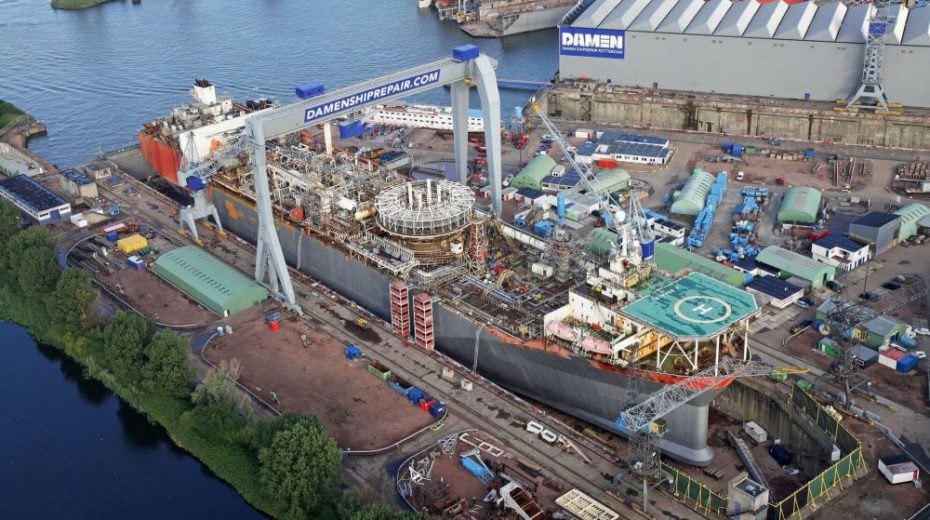
Europe’s naval defense initiatives are increasingly uncertain as Dutch shipbuilder Damen Shipyards NV grapples with allegations of corruption, sanctions breaches, halted payments, and workforce disputes—raising questions about NATO’s capacity to fulfill urgent rearmament objectives.
In February, Dutch Crown Princess Amalia launched the combat support vessel Den Helder in the city of Den Helder, symbolizing the Netherlands’ expertise in shipbuilding. However, within a few months, Damen Shipyards NV became embroiled in legal troubles and financial difficulties that threaten NATO’s naval upgrade efforts during a pivotal moment.
The firm, employing 12,000 people across 55 subsidiaries, faces accusations including bribery, forgery, money laundering, and violating sanctions against Russia from 2006 through 2017. Prosecutors claim the shipbuilder delivered cranes potentially used by Russia’s military industry despite restrictions imposed after 2022. Convictions might result in fines reaching 10% of annual revenue—exceeding €300 million—and could lead to exclusion from EU defense contracts.
The corruption trial involving current and former executives is set to begin on November 24, with the sanctions case expected before the year’s end. Legal commentators warn that guilty rulings could severely impact both Damen and the broader European shipbuilding sector.
Financial Strain Worsens with German Payment Freeze
Germany, one of Damen’s biggest clients, recently suspended a €671 million installment connected to its €9 billion deal for six F126 frigates after a missed delivery deadline. Although Berlin emphasizes the continuation of the program, this freeze triggered what Damen described as a “temporary cash flow problem.”
In July, the Dutch government authorized a €270 million emergency aid package, signifying the company’s crucial role in NATO’s supply network. While Damen asserts overall financial stability, Dutch authorities emphasize the company’s importance to national security.
Controversy Surrounds New UK Contract
Despite ongoing prosecutions, Damen secured a £200 million contract on September 20 to provide 24 auxiliary vessels for the Royal Navy under an £850 million project managed by Serco. This award has attracted scrutiny in London, where experts questioned the prudence of awarding a contract to a firm under criminal investigation.
Observers highlight that Europe has very few shipyards capable of producing sophisticated warships, limiting government options. Nick Childs, a senior fellow at the International Institute for Strategic Studies, noted that delays or failures at Damen could disrupt NATO defense strategies.
Labor Disputes Emerge in Romania
The turmoil has extended to Damen’s affiliates. On September 18, union members from Damen Shipyards Mangalia demonstrated at Romania’s Ministry of Economy, protesting sudden contract cancellations, confiscated materials, and demands for subcontractors to restructure. This unrest exposes vulnerabilities in Damen’s Eastern European operations, which are vital for naval and commercial shipbuilding.
Simultaneously, Romania is planning a restricted tender for two OPV 2600 patrol vessels to be built at Damen’s Galati facility. Reports indicate that Western systems such as Thales or Lockheed Martin might be incorporated, showing that contracts remain in motion despite the sector’s strains.
Innovation Continues Amid Challenges
Seeking to demonstrate resilience, Damen announced on September 22 a strategic alliance with AAAPropulsion to implement A-Pod electric drive technology in its tug fleet. This collaboration aims to boost efficiency in port operations and signals the company’s efforts to uphold progress in sectors beyond military shipbuilding.
NATO’s Rearmament Efforts Hang in the Balance
The stakes remain elevated. In June, NATO members committed to elevating defense expenditures from 2% to 5% of GDP, influenced by U.S. President Donald Trump’s pressure. Enhancing submarine detection and anti-submarine warfare capabilities is considered crucial to counter Russia’s expanding undersea activities.
Sidharth Kaushal, senior research fellow at the Royal United Services Institute, cautioned that disruption at Damen could have “significant ramifications not just for the Netherlands but for NATO as a whole,” given Europe’s limited shipyards capable of timely delivery of advanced warships.
Original article: breakbulk.news




